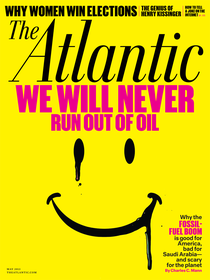 The latest issue of The Atlantic devotes a full 13 pages to answering the question, “What If We Never Run Out of Oil?” Among the more interesting discussion points: People who spend much of their time shouting for cleaner fuel sources frown on fracking for natural gas.
The latest issue of The Atlantic devotes a full 13 pages to answering the question, “What If We Never Run Out of Oil?” Among the more interesting discussion points: People who spend much of their time shouting for cleaner fuel sources frown on fracking for natural gas.
On a broader level still, cheap, plentiful natural gas throws a wrench into efforts to combat climate change. Avoiding the worst effects of climate change, scientists increasingly believe, will require “a complete phase-out of carbon emissions … over 50 years,” in the words of one widely touted scientific estimate that appeared in January. A big, necessary step toward that goal is moving away from coal, still the second-most-important energy source worldwide. Natural gas burns so much cleaner than coal that converting power plants from coal to gas—a switch promoted by the deluge of gas from fracking—has already reduced U.S. greenhouse-gas emissions to their lowest levels since Newt Gingrich’s heyday.
Yet natural gas isn’t that clean; burning it produces carbon dioxide. Researchers view it as a temporary “bridge fuel,” something that can power nations while they make the transition away from oil and coal. But if societies do not take advantage of that bridge to enact anti-carbon policies, says Michael Levi, the director of the Program on Energy Security and Climate Change at the Council on Foreign Relations, natural gas could be “a bridge from the coal-fired past to the coal-fired future.”
In other words, why would people ever agree to the “wrenching transformation” of their lives that climate alarmists seek, when fracking is already helping to address the goals that climate alarmists say they’re pursuing? Of course, the previous question assumes that people will continue to buy into goals that appear more dubious with each passing day.


